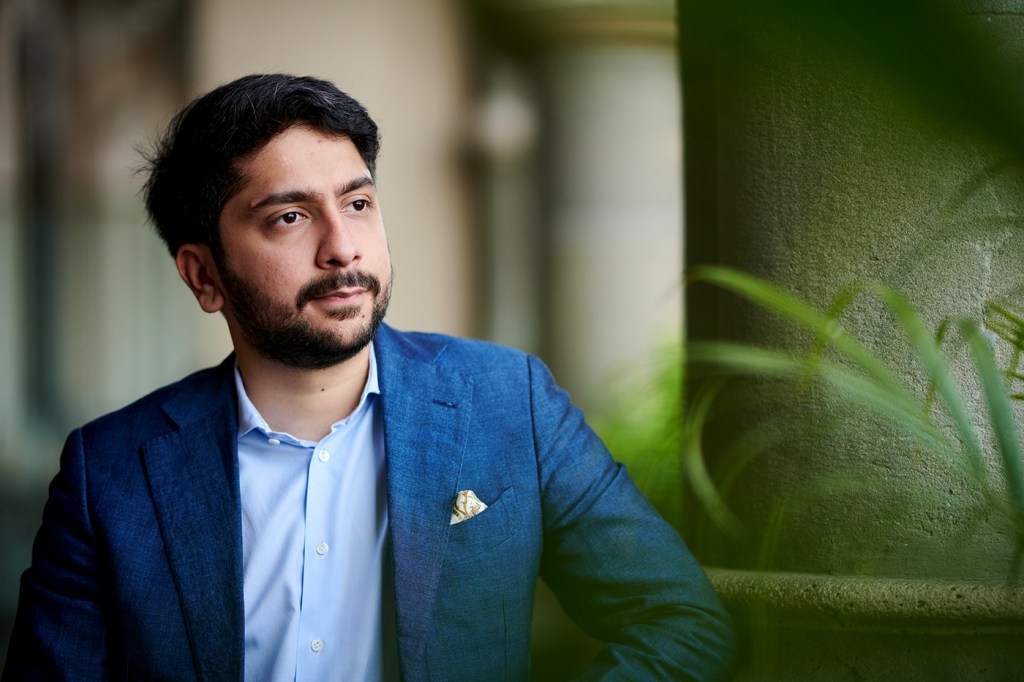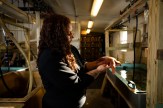He’s mixing Indian heritage into the global fashion scene

MUMBAI, India—Prasan Shah grew up hearing the whirring sounds of sewing machines from his family’s garment factory in India, which manufactured clothing that was then sold by prominent designers. But he never seriously considered joining his family’s clothing manufacturing business until reflecting on his final co-op experience in Hunan Province, China, as well as what he learned from a class on managing family businesses he took at Northeastern.
“The class made me realize that I am lucky to have this base that my grandfather and father worked very hard to build,” he says.
Shah joined his family’s clothing manufacturing business after graduating from Northeastern in 2016, determined not only to strengthen its foundation, but to help shape its future and solidify the family legacy. He soon focused on a new dimension of the company: clothing design. Three years later, the Original Madras Trading Company (OMTC) fashion line was born.
“It’s quite special to be able to do this,” he says.
This new venture has propelled the family into the spotlight after years of making apparel behind the scenes. Fifty years ago, in order to find American clients for his business, Shah’s grandfather journeyed from his hometown of Madras, India to open an office for his growing company (also called OMTC) in New York City. Over time, Shah’s grandfather collected an enviable list of clients that remain “some of the biggest names in American retail,” and began manufacturing their garments from factories in India.
“He really saw the future,” Shah says. From that same office, Shah prepared to launch his family’s first fully original retail designs.

His father diversified the company from garment manufacturing to textiles, and then food production through a line of tangy pickles. Though Shah is immersed in all of these enterprises, it is the new fashion collection he finds most exciting. He started by joining forces with his father and a designer to create bright, breathable pants, button-down shirts, shorts, and unconstructed blazers in distinctive checkered patterns similar to plaid. While the patterns are ubiquitous among a preppy Martha’s Vineyard set, they actually hail from Madras (which was renamed Chennai in 1996).
The style gained international traction in the 18th and 19th centuries as a result of the criss-crossing trade routes of the East India Company, a private company that fueled the growth of the British Empire in India. Madras was an important port for the British, who became enamored by the checkered, light fabric worn by locals and spread it far beyond South India, though that popularity seldom benefitted the areas where the style originated.
“Madras has had its cycles in the men’s fashion world,” Shah says. “With what we’re doing, it’s exciting to bring madras [checks] back on the fashion map.”
And in stark contrast to other companies that utilize the checkered print, Shah says OMTC is steeped in the traditions of the city’s past. They have hired full-time weavers to hand-loom their entire collection in Chennai itself; most companies that showcase these patterns manufacture their apparel outside of Chennai on machines.
“We were keen to revive this weaving community, which is very much a dying community in [Chennai],” he says.
OMTC soon hit several key milestones in 2019 and in 2020. Last year, the collection was selected to appear at Pitti Immagine Uomo, one of the world’s most prestigious fashion showcases, in Florence. Then, when the line officially launched in March 2020, it met with early success: one of the first stores to sell their apparel was luxury department store Bergdorf Goodman.
“Some brands exist for many, many years before they’re recognized by a store like that,” Shah says.
More stores across the world—from Italy and France to Japan and South Korea—started to show interest in their products following their success at fashion shows worldwide.
Forty-five stores began carrying their clothes, but unfortunately, sales have largely paused following the spread of coronavirus. As the virus transformed into a pandemic, storefronts began to close and economies ground to a halt.
The pandemic will most likely leave a lasting impact on the fashion industry. Shah says industry experts are discussing a post-coronavirus world—whenever that may be—in which many wholesalers could be out of business.
“It’s going to be a lot more difficult going forward,” Shah says.
Still, he believes that OMTC’s unique qualities will give it an advantage in the months and years to come: the family story, handmade clothing, the slow, sustainable process that is the opposite of fast fashion.
Shah also hopes these characteristics can help dispel stereotypes of Indian manufacturing, specifically that it’s all low-cost, cheap labor. He says, “people are willing to pay a premium for something made in France. Well, I feel the same way about India and the crafts that we have here.”
When markets do open again, OMTC will be eager and ready to share its designs with the world—designs that offer a fresh take on a distinctive heritage. And they will be made by weavers with generational knowledge at their fingertips, who understand what madras checks are all about.
“Madras is why we are where we are—as a family and as a company,” Shah says. “We wanted to do something that gave back to the community, and at the same time create a refined fashion line that works globally.”
Shah is a member of Northeastern’s Young Global Leaders program, which comprises more than 100 recent graduates who advise university leadership and help to strengthen Northeastern’s network of international alumni.
For media inquiries, please contact media@northeastern.edu.





